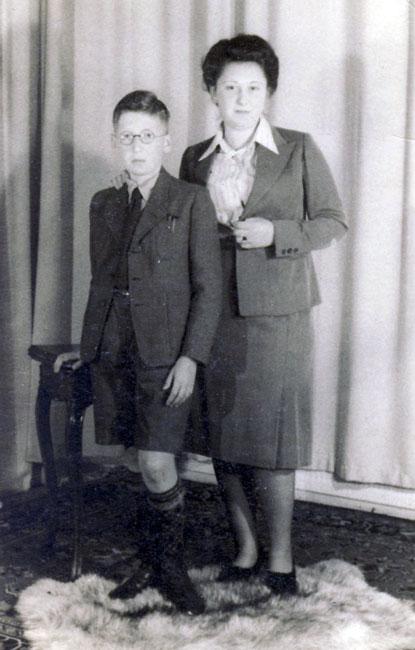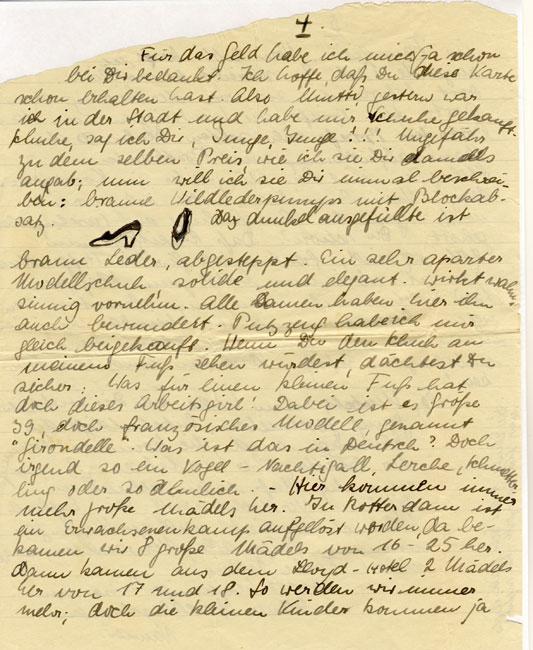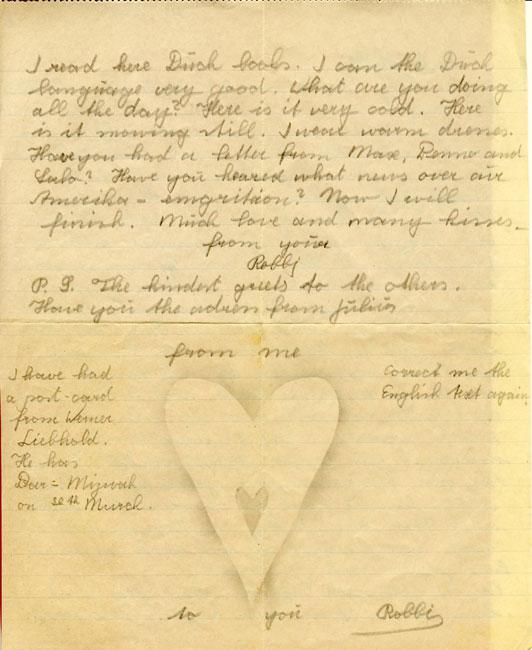





Sunday to Thursday: 09:00-17:00
Fridays and Holiday eves: 09:00-14:00
Yad Vashem is closed on Saturdays and all Jewish Holidays.
Entrance to the Holocaust History Museum is not permitted for children under the age of 10. Babies in strollers or carriers will not be permitted to enter.






The Weill family lived in Mannheim, Germany. Following Kristallnacht in November 1938, the father, Eugen, was deported to Dachau concentration camp and perished there about six weeks later. A package containing his personal effects was posted to his wife, Selma. At the beginning of January 1939, less than two weeks after Eugen's death, the children, Marianne (Nanna) aged 16 and Robert (Robbi) aged 11, were sent were sent to Holland where it was assumed that they would be safe. Sometime later Selma also managed to leave Germany and escaped to London.
While they were moving around Holland, from place to place, from institution to institution, the children made sure to maintain contact with their mother. They involved her in their lives, their troubles and their hopes. They expressed the hope that the three of them would receive visas to the United States and that they would be reunited.
The characters of the two children shine through the letters. Robert, a refined, thoughtful child, fell ill with diphtheria. In his correspondence with his mother, he tells her again and again that he is 'positive'; that is, that he is still has the disease.
Dear Mutti,
On your birthday I wish you everything good and that in the future you won't need to worry so much… All of us are hoping that I will be 'negative' by your birthday. That would definitely be the best birthday present for you. (6 February 1940).
Robert's illness necessitated being separated from other children. His health worried him and he described his visits to doctors, his quarantine and the treatments that he underwent. Although his sister, grandparents and uncles were in Holland, Robert was alone in the battle for his health.
Marianne comes across as effervescent and full of life, with a sense of humor. When she told her mother about becoming ill with hepatitis she added,
When the yellow reached its peak (I felt like a butterfly or a canary) my situation began to improve. (24 April 1940)
In the letter that she sent her mother on 17 March 1940, Marianne describes how she and her friends had cleaned the institution where they lived;
Last week we did spring cleaning ahead of Easter… Imagine it, a huge dining room, four girls working and one woman in charge, occasionally helping a bit… the four of us, armed with window cleaning rags, scrubbing brushes, brooms, Vim (cleaning fluid), soap, buckets and other weapons for attacking dirt, standing to attention before a thorough clean… the battle begins. Dirt is the enemy, advancing to the most secret of hiding places. We crawl on all fours, but manage to capture it… at 3:30 PM we finish, the dining room is gleaming but we are blacker than black. Afterwards, if the woman who is in charge goes to look for dust, she needs to wear four of five pairs of glasses in order to find anything. "Yes girls, that is exactly how you are supposed to work!"
At first Marianne and Robert wrote a few lines in English at the end of every letter to their mother. They asked her to correct them and so to help them practice their English. Thus they prepared for being reunited when the three of them could move to America.
Now I will write to you in English. I'm learning a lot from your corrections in English… Have you heard any news about our move to America? (20 February 1940)
Writing in English seems to have been part of the children's efforts to maintain their mother's position of authority in their lives. It was an expression of the optimism that they displayed in the early stages after their move to Holland, although as time passed they wrote less in English and stopped referring to the move to America. In most of the letters, the children and their aunt Rosa Elk focused on the daily struggle for livelihood and the attempts to maintain contact with the rest of the family. It is clear from the letters that their fear for family and friends was growing.
The final contact between Selma and her relatives in Holland was via telegrams sent through the Red Cross, in which Rosa reported the children's wellbeing to her sister. Some of the telegrams did not reach Selma until after Marianne had already perished in Auschwitz. In the final telegram sent to Selma after Marianne's death, Rosa wrote, "Robert is learning to print and he writes lovely cards." Rosa died in 1943 in Amsterdam. Shortly after this telegram was sent, Robert and the rest of the family living in Holland were murdered in Sobibor.
Selma lost her husband, children, mother, sister Rosa and two of her brothers in the Holocaust. She immigrated to Israel in 1949, initially living with her brother Meir (Max) Elk who had immigrated to Eretz Israel before the war. Meir's daughter Hanna remembers that Selma used to cry a lot.
Hanna received Robert and Marianne's letters and a family friend translated them. Miriam Mijatovich-Keesing, a Dutch researcher, contacted Hanna and her husband Oded Meyuhas and with her help they pieced together a picture of the children's lives in Holland until their deaths.
All the research, together with the correspondence between the children and their mother, the pictures and the translations, were submitted to the Yad Vashem Archives by Hanna and Oded.
"I felt a deep need to get to know these two children. It was my mission to commemorate them and to give their names a human dimension, with wishes, skills and hopes," said Oded. "I feel that I have fulfilled a commandment. Anyone who can, has to undertake this effort of behalf of those who were murdered so that their stories will not be forgotten and the documentation will be complete."

Thank you for registering to receive information from Yad Vashem.
You will receive periodic updates regarding recent events, publications and new initiatives.

"The work of Yad Vashem is critical and necessary to remind the world of the consequences of hate"
Paul Daly
#GivingTuesday
Donate to Educate Against Hate


Worldwide antisemitism is on the rise.
At Yad Vashem, we strive to make the world a better place by combating antisemitism through teacher training, international lectures and workshops and online courses.
We need you to partner with us in this vital mission to #EducateAgainstHate
The good news:
The Yad Vashem website had recently undergone a major upgrade!
The less good news:
The page you are looking for has apparently been moved.
We are therefore redirecting you to what we hope will be a useful landing page.
For any questions/clarifications/problems, please contact: webmaster@yadvashem.org.il
Press the X button to continue



